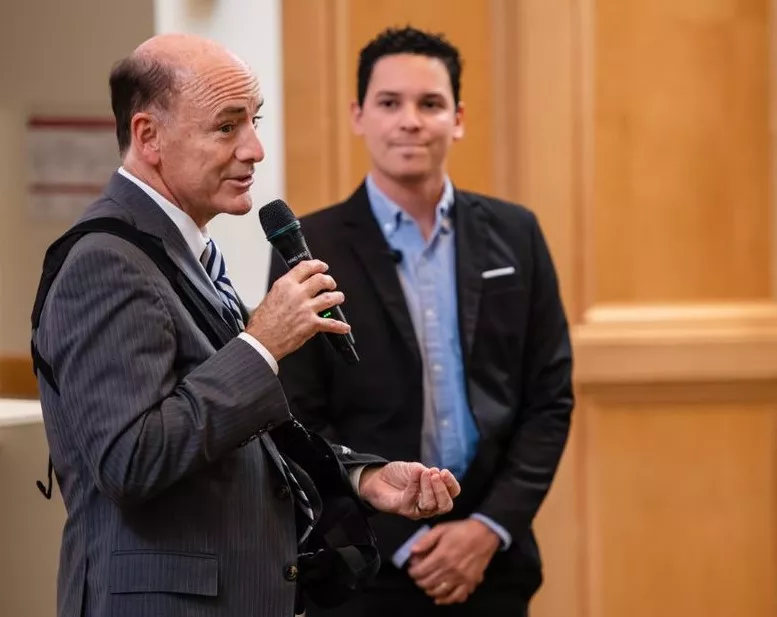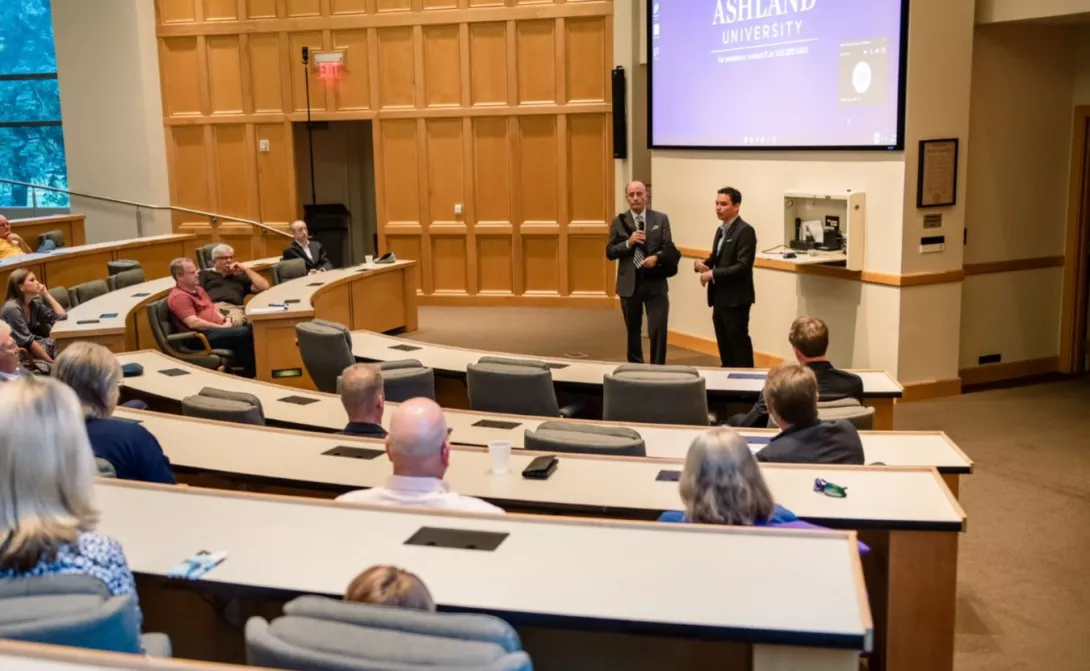
Political refugee and independent journalist describes life in Cuba to crowd at Ashland University
You are at an ATM when a car pulls up and two people inside order you to get in it.
When you ask for identification, they say they are police officers, and you have to follow their orders.
Everything goes black because they put a hood over your head as soon as you get in, take you to an unfamiliar house and don’t free you until they have threatened and interrogated you for several hours.
Welcome to Cuba.
Those in attendance and watching a live stream got to feel what life is like in the socialist Latin American country through the stories of Cuban native Yoe Suárez during a Faith and Society lecture event Wednesday, Aug. 2 in Ashland University’s Dwight Schar College of Education’s Ronk Auditorium.
While “short kidnappings” don’t happen to every Cuban, the threat is always there, especially for someone like Suárez, an independent Cuban journalist who writes articles critical of the regime.
“It was pretty scary,” said Suárez, a visiting scholar in Ashland. “My wife was waiting for me with my child to have lunch at the house.
“Sadly, these stories are common in Cuba,” added Suárez, whose free presentation, “Faith Under Totalitarianism in the 21st Century: Cuba, Freedom and the Church,” took place in a conversation-style format with AU President Carlos Campo, whose father came to America from Cuba in 1940.

Next thing you know three police officers and a political officer are at your house putting handcuffs on you and “detaining” you for several hours at a police station.
“The same thing happened to another journalist, Yuri Valle Roca, and he is still in jail,” Suárez said. “I didn’t want that to happen to me, so I told them, ‘If you want to talk with me, you have to officially summon me.’ ”
While they retrieved an official summons, Suárez said he posted on social media about this experience, which he believes kept him from being put in jail because of the media pressure.
Experiences like that have happened to Suárez on many occasions from the time he began publishing stories electronically about torture, cyber surveillance and political prisoners for non-state media outlets in 2014 until he; his wife, who also was a journalist in Cuba; and his son, who is now 5 years old, were allowed to enter the United States last summer.
Because he was on a blacklist for 2 ½ years, Suárez couldn’t leave Cuba. But, after mediation from some Christian leaders, Suárez was able to accept an invitation from a human rights organization to go to America, where he presented a film in Miami and Washington, D.C., that he and a team of friends secretly filmed telling the truth about what’s going on religious freedom in Cuba, before coming to Ashland.
“We hope in Cuba the regime falls quickly because we left friends and family there who are suffering,” said Suárez, who is seeking political asylum in the U.S. because he is banned from returning to his home country that he says is struggling with inflation, starvation and regular power blackouts, as well as about 300,000 citizens fleeing from it the past year.

When you gather in a home with Christians for a church service in Cuba seeking religious freedom, the pastor from the apostolic movement has often been arrested and sometimes the government even destroys the house with a bulldozer.
“If you try to build a college like this in Cuba, private and Christian, you are going to be in jail, Carlos,” Suárez said.
During his time in Ashland, Suárez is working on a book “about very brave pastors in Cuba who are preaching the good work of the Lord and not putting aside what is happening in Cuba” and “the clash between the Christian ethic and the socialist ethic … to inspire people, letting them know that there are people in Cuba telling the truth.”
Suárez said he doesn’t consider himself that special of a man for “telling the truth” in the face of threats, losing his job and possible jail time.
“I think I have a special God and God tells me to tell the truth,” said Suárez, who added that Cuba has many anonymous heroes doing what they can to end Cuba’s totalitarian regime. “There are a lot of people making a change in their heart, maybe not speaking out, but doing what they have to do to not betray their moral sense. That’s powerful.”
Maybe that can someday lead to the fall of the socialist system in Cuba.
“The spiritual landscape there is growing,” Suárez said. “I think it’s a good thing because those people who believe in God are rejecting the state as a god. The totalitarian state is trying to put the state in the place of God. People are looking back to God, and that’s good.”